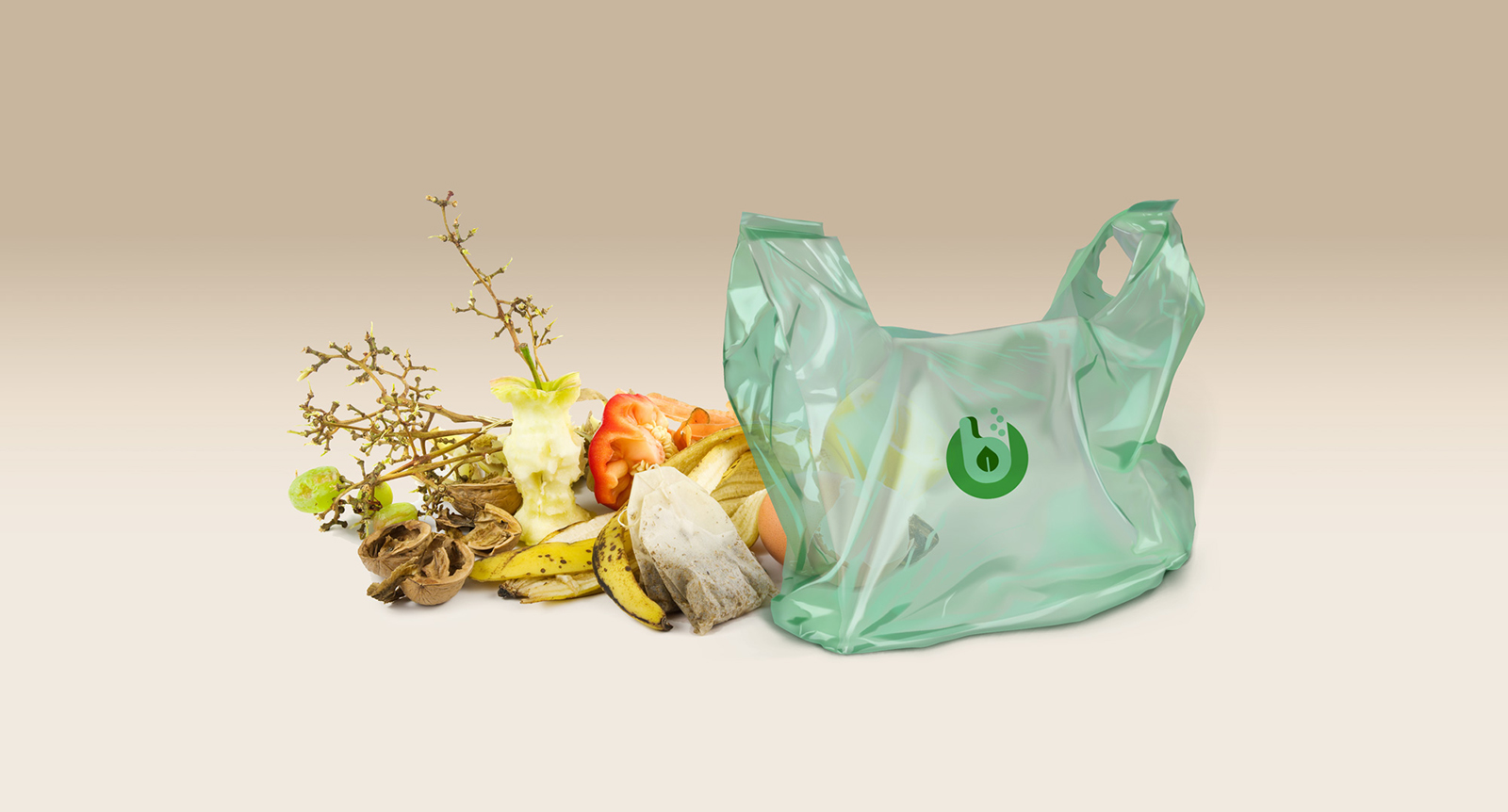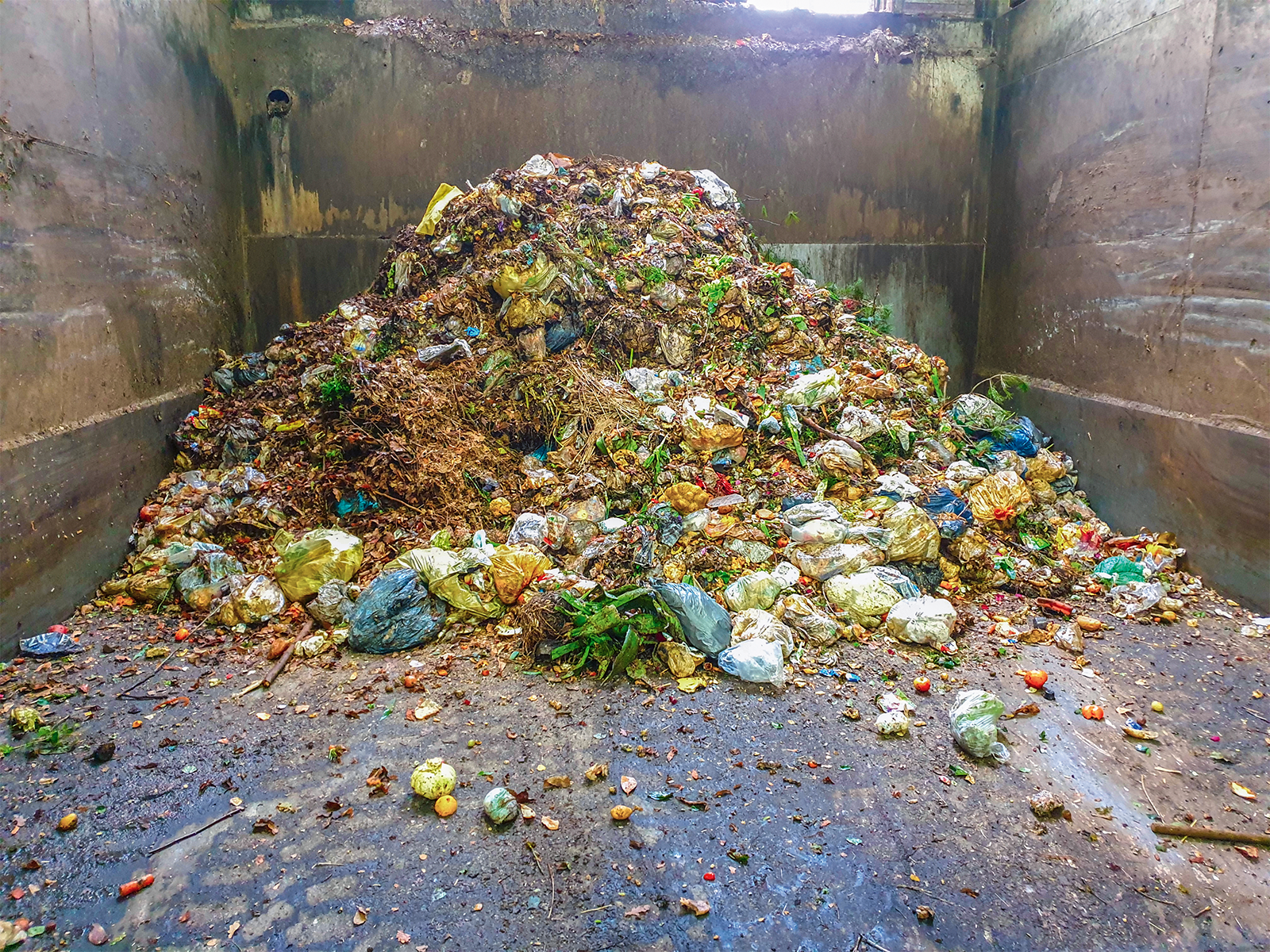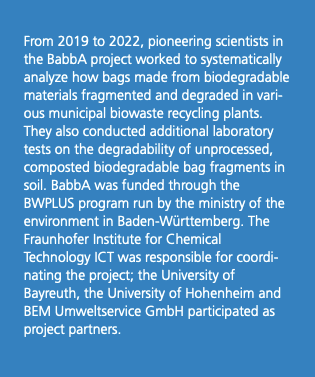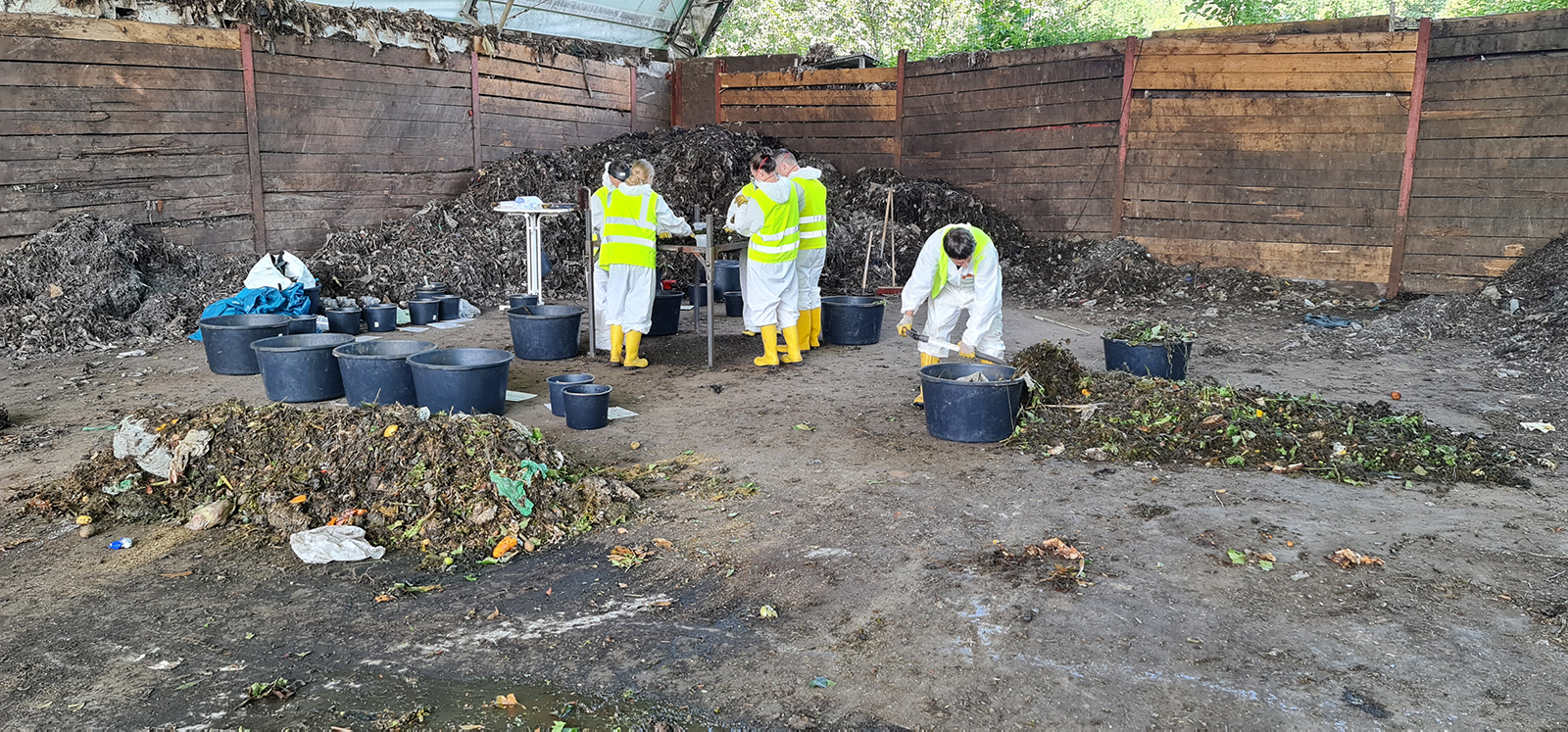
(Note from editorial office: You may find a response (only in German language) of the Verbund Kompostierbare Produkte e.V. at https://renewable-carbon.eu/news/stellungnahme-projekt-babba-vollstandiger-abbau-der-biogut-sammelbeutel-bestatigt/(opens in a new tab).
Bags made from biodegradable materials for collecting organic household waste have been available on the market for several years. Now researchers in a large-scale pilot study have conducted an extensive investigation into whether these bags fully decompose. In addition, this — the first of its kind — study also took a look into the consumers interest in using biode-gradable bags. The project was coordinated by the Fraunhofer Institute for Chemical Technology ICT in collaboration with the University of Bayreuth, the University of Hohenheim and BEM Umweltservice GmbH participating as research partners. The results are in: For numerous reasons, the researchers are not currently recommending the use of biodegradable organic waste bags.
The goal of the BabbA project on biodegradable bags in organic waste collection was to analyze how biodegradable bags degrade in existing biowaste recycling plants and to shed more light on the bags’ potential environmental impact. In addition, the pilot study investigated whether the general public has adopted these biodegradable bags for organic waste collections and if such bags therefore have the potential to replace conventional plastic bags made from polyethylene (PE). The researchers also worked to find out whether the use of collection bags made from biodegradable materials and paper reduces the overall foreign matter content in organic waste. The research focus can be summed up in a question with great relevance for our daily lives: Are bags made from biodegradable materials a good alternative for household organic biowaste collections? The work on this research project was funded by the BWPLUS program for safeguarding environmental resources (Lebensgrundlage Umwelt und ihre Sicherung), which is funded by the state of Baden-Württemberg.
Organic waste as an energy source

Although people have to separate waste in Germany, significant amounts of plastic still end up being sent to biowaste recycling plants with the organic waste — presumably because people just find it more convenient or hygienic to use a plastic bag to collect organic waste in their house or apartment. However, these bags — both concentional plastic bags and the ones made from biodegradable plastics — need to be separated before the organic waste goes for recycling, so they don’t end up in the compost waste fraction. This is a time-consuming undertaking, and some valuable organic material always gets lost in the process. People often do not consider using paper bags as an alternative, as they believe these are less moisture-resistant and could tear open on the way to the organic waste collection bin. This is just one reason that around a third of German households simply dispose of their organic waste with the regular trash. However, organic waste holds huge potential as a source of valuable energy and important plant nutrients. It is a source of biogas, which can be used to generate electricity, and its end products, such as compost, can be used as an organic fertilizer, which reduces the use of artificial fertilizers. This means recycling organic waste can make an important contribution to the energy transition and sustainability, while also reducing dependencies on international supply chains.
No guarantee of decomposition with biodegradable plastic
Using plastic bags made from biodegradable materials could be a viable solution for organic waste collections — they fulfill the public’s hygiene requirements and increase the proportion of organic waste that can be recycled. But are these bags really harmless? As methods for analyzing microplastics have improved in the past few years, there has also been a dramatic increase in knowledge and awareness regarding the potential risks that micro- and nanoplastics pose to the environment. It is clear at this stage that the smaller the particles are, the greater their potential environmental impact will be.
“The current quality criteria for compost have defined limits for plastic fragments, but they only take into account fragments over 1 millimeter in size. Smaller particles are not taken into consideration. If bags made from biodegradable materials do not completely degrade in the biowaste recycling plants and are just broken down into micro- and nanoplastic particles instead, they could make their way into the environment with the compost. And considering the amount of time biowaste currently spends in recycling plants, this is a realistic scenario,” explains BabbA project manager Jens Forberger of Fraunhofer ICT.
A pioneering pilot project
In 2019, researchers in the BabbA project began systematically examining biodegradable bags from every angle — from use by the public to the way they degrade in recycling plants — under real conditions for the first time. The aim was to come to a reliable conclusion on whether biodegradable bags are fit for purpose. In large-scale summer and winter experiments, the project partners distributed 400,000 bags made from different raw materials (Ecovio®, Mater-Bi® and wax-coated paper bags) and informational material to 10,000 households. BEM Umweltservice GmbH worked with the researchers to organize the collection and analysis of the organic waste in the selected districts, both before and after the information campaign. The researchers then examined the resulting compost for plastic fragments. This pioneering work in BabbA was made possible thanks to the preparatory work carried out in project MiKoBo, which was also coordinated by Fraunhofer ICT. In this initiative, a team at the University of Bayreuth laid the foundations for an analytical method of detecting microplastics in compost, digestate and soil.
An innovative approach meets real-world conditions
As the coordinator, Fraunhofer ICT was the driver behind the BabbA project’s innovative approach. The institute worked with BEM Umweltservice GmbH to conduct batch analyses — i.e., examining the composition of the organic waste collections from the pilot regions to determine moisture levels and the proportions of foreign matter and biowaste.
“We collected an initial reference batch before we informed the households about the project and distributed the biodegradable bags. This meant we could compare the two batches that were collected after the information campaign, one in summer and one in winter, with the actual original conditions,” explains Mr. Forberger.
One key to the project’s success was the fact that BEM Umweltservice GmbH was able to give the researchers access to operational biowaste recycling plants — allowing them to observe the way bags made from biodegradable materials fragment and degrade under real-world conditions. Scientists at the University of Bayreuth conducted material flow analyses to examine all the plastic fragments in samples taken from different points throughout the biowaste recycling process (i.e., from the collected biowaste through to the finished compost). In addition to the tests in the recycling plants, researchers at the University of Hohenheim tested how well the collection bags used in the project could degrade in soil.
Biodegradable bags are not recommended

With the recent publication of the final report for project BabbA, the researchers’ results are now available. Through their tests, they were able to prove that composts contain large amounts of microplastics of less than 1 millimeter in size, and that these can remain in the soil over long periods of time. The project group’s initial evaluation is that we should avoid introducing biodegradable bags into real, large-scale biowaste recycling plants until it can be guaranteed that the bags will break down completely. In addition, using paper bags and bags made from biodegradable materials did not positively influence how much organic waste households put out for collection during the pilot project. The amount of organic waste collected did not increase when the bags were distributed to households, and the batch analysis showed the amount of foreign matter in the waste was no lower than it was before the pilot study.
This is another reason why the BabbA project group does not recommend using collection bags made from biodegradable materials; however, they believe paper bags are a promising alternative and should be researched in more detail. The researchers found high levels of biodegradable bag fragments less than 1 millimeter in size; for this reason, they are calling for a critical revision of the current DIN standards for evaluating how well a compostable material can be composted.
Overall, the report provides specific recommendations for the government, waste disposal companies and the general public and will make a valuable contribution to improved utilization of biowaste resources in the future.
Source
Fraunhofer Society, press release, 2023-10-04.
Supplier
BEM Umweltservice
Fraunhofer-Gesellschaft
Fraunhofer-Institut für Chemische Technologie (ICT)
Umweltministerium Baden-Württemberg
Universität Bayreuth
Universität Hohenheim
Share
Renewable Carbon News – Daily Newsletter
Subscribe to our daily email newsletter – the world's leading newsletter on renewable materials and chemicals










